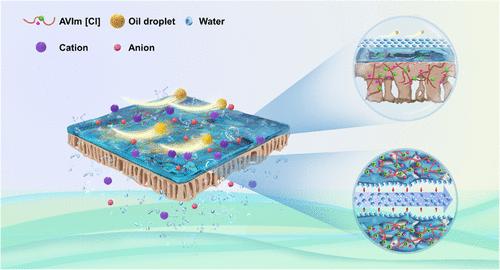Ordered Interfacial Water Generated at Poly(ionic liquid) Membrane Surface Imparts Ultrafast Water Transport and Superoleophobicity
IF 14.4
1区 化学
Q1 CHEMISTRY, MULTIDISCIPLINARY
引用次数: 0
Abstract
Achieving ultrahigh permeance and superoleophobicity is crucial for membrane application. Here, we demonstrated that a poly(ionic liquid)/PES hydrogel membrane can achieve dual goals. The high polarity of the ionic liquids induces the water molecules on the membrane surface to be arranged more ordered, as verified by molecular dynamics (MD) simulation and advanced femtosecond sum frequency generation (SFG) vibrational spectroscopy. Meanwhile, a large amount of water exists in membrane pores, demonstrated by water absorption, low-field nuclear magnetic resonance, and SFG spectroscopy. The interfacial water layer endows the membrane with superior anti-oil-fouling properties, and the large amount of water in membrane pores imparts membrane with ultrahigh permeability. The positive charge on the channel surface and moderate channel size confer a high rejection of metal ions. The optimal membrane exhibited a permeance of 35.1 L m–2 h–1 bar–1, 5–10 times that of conventional hydrogel membranes with similar rejection. Moreover, the membrane exhibited excellent antibacterial properties. It can be expected that highly polar poly(ionic liquid) membranes will find promising applications in the water treatment field.

求助全文
约1分钟内获得全文
求助全文
来源期刊
CiteScore
24.40
自引率
6.00%
发文量
2398
审稿时长
1.6 months
期刊介绍:
The flagship journal of the American Chemical Society, known as the Journal of the American Chemical Society (JACS), has been a prestigious publication since its establishment in 1879. It holds a preeminent position in the field of chemistry and related interdisciplinary sciences. JACS is committed to disseminating cutting-edge research papers, covering a wide range of topics, and encompasses approximately 19,000 pages of Articles, Communications, and Perspectives annually. With a weekly publication frequency, JACS plays a vital role in advancing the field of chemistry by providing essential research.

 求助内容:
求助内容: 应助结果提醒方式:
应助结果提醒方式:


